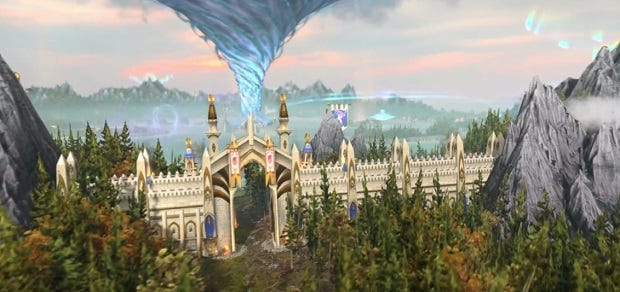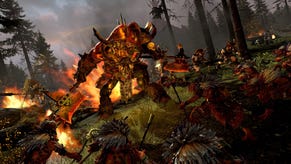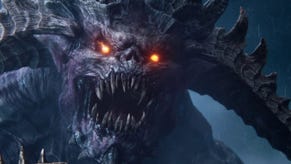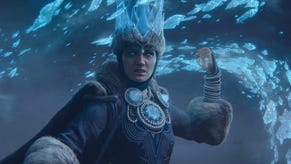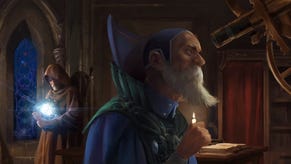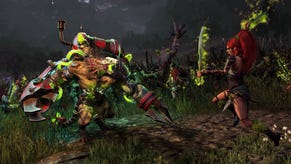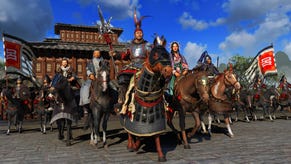Total War: Warhammer 2's campaign rethinks the endgame
Warhammer is changing
Lizards riding dinosaurs. Almighty spells crackling through the sky. A dragon swoops down from above and collides with a stegadon as elves are torn apart and consumed by carnosaurs at its feet. Total War: Warhammer 2 [official site] brings even more spectacle to the battlefield, particularly with its lizardmen armies, but the campaign is looking like the most exciting part of the game.
Strategy games have a habit of petering out as you move toward the endgame. Anyone who's played Civ (including Civ V designer Jon Shafer) knows the tedium of pushing end turn to watch the numbers grow, as your inevitable crawl toward victory or defeat plays out in turn-based slow motion. That's partly because so many victory conditions involve watching the correct resource pile up in sufficient quantity, or painting the entire map in a certain colour. Discovery is a thing of the past, diplomacy has run its course, and there is nothing new under the sun. Creative Assembly are looking to change that.
A direct sequel to the latest title in a series that has been running for the better part of two decades might seem like an odd place to look for radical change, but Total Warhammer 1 itself required a refreshing of the rulebook if not a total reinvention of the wheel. At its heart, Total War is the same as its ever been – a strategic campaign map and large-scale tactical battles – but for their first fantasy title, Creative Assembly had to make some drastic changes. Jim Whitson, game designer, gave me a little of the history.
“The one thing we did at the beginning of Warhammer 1, very early on, was to build new systems to help us balance the game. We acknowledged that we needed to keep the complications and differences between the factions. The asymmetry is key to the entire thing, so we made sure to get that right early on, made sure we had the tools to build it and balance it.
“But it did go against some of our knowledge and instincts to build these asymmetrical factions. We're so accustomed to balancing in a certain way. You wouldn't believe the debates we had internally: "What, vampires don't have missile units? But it's Total War! We need balanced armies!"
Game director Ian Roxburgh jumps in, recreating the debate: "Shall we make skeleton archers? No!" He's already spent some time talking about Warhammer armies in a way that suggests he's been consuming Games Workshop literature for breakfast, lunch and dinner. "We came in with a lot of ideas but then there are fifteen army books, the Black Library, all of the things that Games Workshop have built, so we'll never be stuck for fresh ideas."
At this point, I suggested that Warhammer might have been a useful palette cleanser, refreshing the traditions of Total War. Roxburgh agrees: "Yeah. It gives us aerial units, which introduce so many new tactical options. It forces you out of the mould, and forces you to find new ways to tackle problems. Each army has its own problems and tools to deal with those problems.We wanted to be true to the ideas. We knew it would be hard to balance but we took that on the chin, and made sure we put the effort in to find that balance alongside the asymmetry.”
And that brings us to the biggest change in the sequel. It's not the dinosaurs, though they are a tremendous addition, and it's not the new jungle terrain, which makes the game look like something entirely new rather than a massive expansion pack. It's the changes to the campaign; chiefly, The Great Vortex that crackles and hums at the heart of the map, on the Isle of the Dead.
Whitson explains: "In Warhammer II, there are even more changes to our usual formula, especially in the campaign mechanics. Because one of the things we've done is to really increase the idea of diversity, which was universally appreciated to the extent that we felt vindicated in our decisions. So it's not just the tactical battles this time; the campaigns are going to be even more different as well.
"Total War has and will always be a sandbox game. We'll never move away from that. But at the same time, we're bringing in an extra level of narrative, tying into the vortex, and that creates a very important campaign mechanic that we've never done in Total War before, and that deals with the whole endgame."
I've been playing strategy games for almost three decades and I'm often convinced that a strong endgame is an impossible dream, or at least a rare treat. Campaigns tend to end with a whimper or a quiet hurrah, fading away rather than burning out in a blaze of glory. It's something that Whitson recognises and that he has been thinking about.
"You own half the world, you know you're going to win, you can't lose. Or you might just drop out and start a new game; there's no incentive to continue.
"Now there are mechanics that allow you to influence the vortex, and you can win the game by being the first to complete your faction's specific mechanic, but it's not solely based on territory. Even if you have half the world, you might still feel that you can dominate with your armies and beat everyone up, but you need to keep an eye on how the other races are interacting with the vortex. There's always a chance that you could lose and that the balance of power could be overturned. It adds a whole new dimension to the psyche of a campaign."
Essentially, each faction has their own unique way of dealing with the Vortex and completing the steps associated with it brings about a climactic battle. You can always see how far along that particular path to victory - and it's an additional path rather than a replacement - each faction has travelled. It's a form of doomsday tracker and what will be interesting is seeing how flexible it makes the flow of a campaign. Struggling to stay on top in a military sense? Maybe it's time to concentrate your efforts on Vortex rituals.
"You can engage with that process, or you can ignore it and try to crush anyone who does engage with it. There are all manner of sandbox ways to interact with it, and one of those is ignoring it completely", says Whitson.
"Because the races have their own motivations and reasons to interact with the vortex, tied into the narrative, what we've found in focus groups is that there's a strong desire to engage with the new mechanics because it's good fun, and fits with your faction's story", Roxburgh adds. "But it is perfectly valid to just smash up the other factions, or wait for them to trigger their final ritual and then try to beat them in the final battle that occurs in the aftermath. Traditionally we've been very good at the short and medium term goals, and offering a wide variety of those, and now we're trying to build a long-term equivalent."
For each faction, there are five rituals to complete and the final one brings about that climactic battle. But the rituals aren't just a case of adding to a stockpile of victory points; they all lead to what Whitson calls "a gameplay moment" where "for a certain period of time you need to hold firm and protect what you're doing. At each ritual's end there's a period of time where the whole world is in a bit of a..." I offer the word 'tizzy'. "Yes, a tizzy!"
What this means, in Whitson's words, is that "there are multiple chunks of gameplay colliding", and these interruptions to the regular flow of the game, either started by yourself or one of the other factions, should inform the entire shape of a campaign. If the strength of strategy games can be measured, to some extent, in the number of turns that go by before a meaningful decision must be made, the Vortex mechanic could work fantastically well. I'd expected Warhammer II to be new factions and territories without a single big idea to unite them, but the campaign sounds like a wonderfully disruptive core system.
"It's created, in the back of our minds, the idea that this game is so much more interesting than the first Warhammer," says Whitson. The Grand Campaign, which will unify the factions and maps of all three games in the trilogy, is suddenly looking more complex, and fascinating, than ever. If Warhammer II's campaign works as well as I hope it might, long may the breaking of the Total War mould continue.
Total War: Warhammer 2 is out September 28th.
